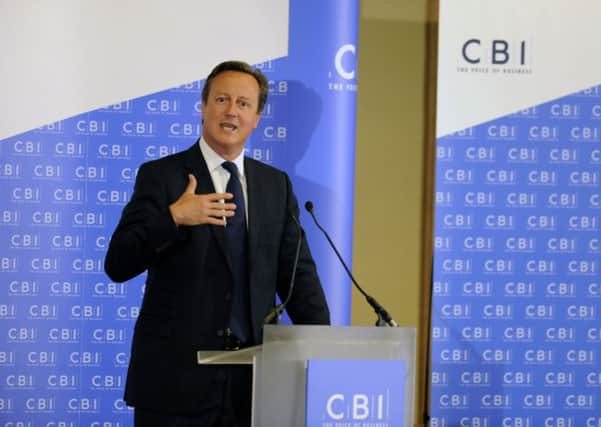Scottish independence: Cameron makes business plea


In a speech at the CBI’s annual dinner in Glasgow, Mr Cameron argued that being part of the UK enabled Scotland to “punch above its weight”.
He also attacked First Minister Alex Salmond’s currency plans and his threat not to pay an independent Scotland’s debts.
Advertisement
Hide AdAdvertisement
Hide AdHailing the 1707 Union as the “greatest merger in history”, the Prime Minister said the UK was “inextricably linked” by history, family, values and trade.
Mr Cameron arrived at the CBI dinner at the end of a difficult day which saw the Tories rocked by the defection of MP Douglas Carswell to Ukip.
There was further embarrassment for the PM when CBI president Sir Mike Rake warned that the EU referendum was causing concern for business “regarding their future investment plans”.
Mr Cameron responded, however, by saying there was “no evidence” of declining investment and he believed in giving people a say in important issues such as EU membership and Scottish independence.
During his speech, which praised the Scottish entrepreneurial spirit, Mr Cameron spoke of the advantages of remaining within a “top six” economy with one of the biggest diplomatic networks in the world.
He warned independence would see a private sector with its “wings clipped, horizons narrowed” and “scope limited”.
The Prime Minister’s visit, exactly three weeks before the referendum, attracted a crowd of around 150 Yes-supporting demonstrators outside the event at the Hilton Hotel. Also, there was a bus full of representatives of Business for Scotland, the independence-supporting group.
Advertisement
Hide AdAdvertisement
Hide AdMr Cameron criticised the SNP leader’s plans for a formal currency union after independence, saying such an arrangement required economic and political union.
Mocking Mr Salmond’s refusal to specify a currency Plan B, Mr Cameron referred to the First Minister’s claim in the recent BBC debate that there were three other currency options.
“They’re apparently like buses – they (Plan Bs) all come along at the same time,” Mr
Cameron said. “The only problem is, they’re all going in the wrong direction and he refuses to jump on any of them.”
Using the euro and a separate Scottish currency had been ruled out by Mr Salmond, Mr Cameron claimed, while the sterlingisation option – using the pound without central bank support – had been rejected by Mr Salmond’s fiscal commission.
“The choice is clear,” Mr Cameron said. “Stay together and retain that certainty of a single currency or take a leap into the great unknown with the man without a plan.”
Mr Cameron was also withering about suggestions that an independent Scotland would refuse to take on its share of the UK’s debt, if not granted a share of the Bank of England.
“Has this really been thought through?” Mr Cameron asked. “You don’t force someone to underwrite your future debts by threatening not to honour your past debts – that’s not what any responsible government or person would choose to do.”
Advertisement
Hide AdAdvertisement
Hide AdEarlier this year, the CBI angered many of its members when it registered with the Electoral Commission as an official No campaigner.
Businesses who wished to remain politically neutral quit the organisation, which was forced to withdraw its status.
Mr Cameron quoted a British Chambers of Commerce survey which found that 85 per cent of business people wanted Scotland to stay in Britain.
He also hailed the “powerful intervention” of 130 Scottish business figures who wrote to The Scotsman this week to say the business case for independence had not been made.
He said: “Let’s choose openness over narrowness; our great advantages over the great unknown and let’s stay together.”
However, Tony Banks, chair of Business for Scotland, said: “Scotland more than pays her way. It is clear to us that UK governments do not pay sufficient attention to the interests of Scottish businesses, bewitched as they are by the smoke and mirrors of the City of London.
“Staying in the EU and freeing up Scotland’s government to act on our behalf is what is in our best interests.”
SEE ALSO